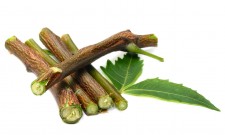Neem and TMJ Pain Discussed by the Sacramento Dentistry Group

Sacramento, CA, November 15, 2017 (Newswire.com) - Neem is a tree native to India. Its leaves have historically been used for dental hygiene. To this day, it is still a popular ingredient in mouthwashes and oral cleansers used in that country. Can neem be part of a daily oral hygiene routine and will it help temporomandibular joint (TMJ) pain?
What is Neem?
The effectiveness of neem tree (Azadirachta indica) products for use in oral maintenance and as an anti-inflammatory has been studied scientifically in various countries outside the United States. It appears that neem extract performs approximately as well for reducing gum disease as typical anti-gingivitis mouthwashes used by dentists, although study results are mixed. If neem does have a therapeutic effect, it is believed that the cause is twofold: 1) neem reduces tissue inflammation, a common side effect of gingivitis and periodontitis; and 2) the leaves appear to have a slight anti-bacterial action against oral microbes. Potentially beneficial extracts can also be harvested from other parts of the plant, but the leaves are traditionally the source of indigenous dental treatments.
What Causes TMJ Pain?
The TMJ joint is located where the lower jaw meets the sockets on both sides of the skull. A complex joint, it is able to move up and down, as well as side to side, with considerable freedom of articulation. A number of factors can lead to TMJ pain, including trauma, genetic disorders and bad oral habits, such as clenching the teeth. Since the jaw is used extensively throughout the day, any pain in this joint can become debilitating.
Despite the availability of pharmaceutical treatments, many patients seek alternative therapies for their pain. In managing TMJ disorders, however, simply dulling the pain, whether with common over-the-counter analgesics or naturotherapy products, is an incomplete cure. At the Sacramento Dentistry Group, patients with TMJ syndrome are carefully and gently examined to determine if there is a physical cause for the pain that can be treated with muscular therapy, orthodontics or oral surgery. A dentist’s consultation also determines if untoward behaviors are contributing to the problem. Wherever possible, painkillers alone, including anti-inflammatories of any kind, should be viewed as an adjunct to treatment — not the treatment itself.
So Does Neem Work?
Neem is promoted by the naturotherapy community as a treatment for pain, including that caused by TMJ syndrome. In a search of the scientific literature, however, neem studies on anti-inflammatory properties appear limited to in vitro or small animal experiments. Is neem effective in humans for pain relief? Given the scant availability of studies, the best motto is “buyer beware.” It is worth noting, that it should never be assumed that an herbal treatment is “safe” simply because the product comes from a plant. A large quantity of today’s prescription medicines are made up of plant products, yet their use is still carefully monitored. Anything consumed for medicinal purposes is essentially “medicine,” and the misuse of any medicine can result in further illness.
For further information on neem and TMJ issues, visit the website of the Sacramento Dentistry Group. For TMJ consultation and treatment, contact them via their online request form or at 916-538-6900.
Source: Sacramento Dentistry Group
